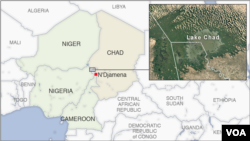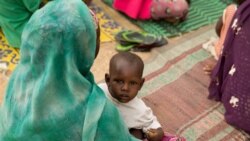Cameroonian, Nigerian and Chadian troops fighting terrorism in the Lake Chad basin say attacks on military positions have been increasing since Boko Haram leader Aboubakar Shekau was declared dead in May.
Military officials from the three countries say the Islamic State in West Africa Province group, or ISWAP, is completely changing terrorism tactics to gain the sympathy of Lake Chad basin civilians. They say ISWAP is emerging as the terrorist group that is taking over from Boko Haram, which is weakened by the death of its leader Shekau.
Major General Saly Mohamadou is commander of Cameroon’s troops fighting terrorism in the Lake Chad Basin. He says, unlike Boko Haram, which attacked civilians for supplies and killed both the military and people who opposed the terrorist group when it was very active, ISWAP only attacks military positions to gain support from civilians. He says ISWAP is fighting to control border areas between Cameroon, Chad and Nigeria.
Mohamadou said senior military officials of the Multinational Joint Task Force or MNJTF met in Maroua, Cameroon this week to formulate a strategy toward the new terrorism threat.
The task force, headquartered in the Chadian capital of N'djamena, is made up of more than 10,000 troops from Niger, Cameroon, Chad and Nigeria.
The MNJTF says militants have carried out scores of attacks on its military positions since May, causing many casualties, but gives no further details.
Officials accuse ISWAP of infiltrating areas along the Cameroon-Nigeria-Chad border. Cameroonian authorities say ISWAP promises jobs and better living conditions to convince vulnerable and jobless youths to join the terror group.
The governor of Cameroon's Far North region, on the border with Nigeria and Chad Midjiyawa Bakari says Cameroon is carrying out actions that will keep its civilians from sympathizing with terrorists. He says besides fighting terrorists, Cameroon troops have been teaching children in schools abandoned by teachers because of terrorism. He says military medical teams treat wounded and sick civilians who are in villages on Cameroon's northern border with Nigeria that are hard to reach. Bakari says the military distributes food and water to civilians in former Boko Haram strongholds.
The governor also said that to stop ISWAP from recruiting vulnerable youths, Cameroon ordered the creation of militias in all northern villages.
ISWAP has not made any formal statement on its expansion to the Lake Chad Basin.
In August though, the International Institute for Strategic Studies said African states should act quickly to stop the restructuring of ISWAP. It says if the countries fail to act, Islamic State’s plans to expand in the region will further endanger millions of Africans.





